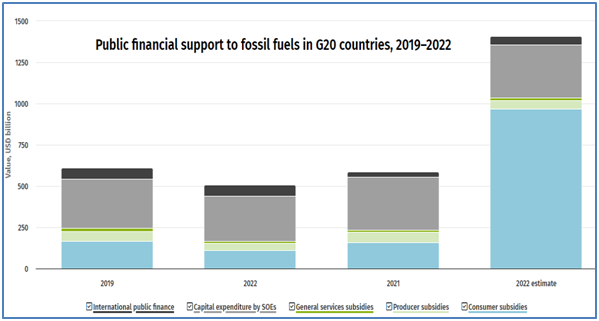G20 Provides Record Financial Support for Fossil Fuels
26-08-2023
01:29 PM
1 min read

What’s in Today’s Article?
- Why in News?
- Highlights of the IISD Study
- Concerns raised by the IISD Report
- Overarching Recommendations for the G20
- Way Ahead for G20 Governments and India
- Conclusion

Why in News?
- The International Institute for Sustainable Development (IISD) released a study - Fanning the Flames: G20 Provides Record Financial Support for Fossil Fuels.
- The report comes ahead of the Leaders’ Summit when the Group of 20/ G20 will meet in Delhi on September 9-10 and attempt to gain consensus on climate change.
Highlights of the IISD Study:
- G20 members provided a record $1.4 trillion (~Rs 116 lakh crore) in public money to support fossil fuels in 2022.
- The amount includes fossil fuel subsidies ($1 trillion), investments by state-owned enterprises ($322 billion) and lending from public financial institutions ($50 billion).
- While much of this was support for consumers, around one third (USD 440 billion) was driving investment in new fossil fuel production.
Concerns raised by the IISD Report:
- The financial support for fossil fuels in 2022 is more than double the pre-Covid-19 and pre-energy crisis levels of 2019.
- This support perpetuates the world’s reliance on fossil fuels, paving the way for yet more energy crises due to market volatility and geopolitical security risks.
- It also severely limits the possibilities of achieving climate objectives set by the Paris Agreement by incentivizing greenhouse gas (GHG) emissions while undermining the cost-competitiveness of clean energy.
Overarching Recommendations for the G20:
- Act on climate commitments by eliminating all public financial flows to fossil fuels except those necessary to provide energy access to the poorest.
- The boldest, fastest action should be from the G20’s highest per-capita income members, given their historical responsibility for emissions and higher emissions per unit of GDP.
- Incentivise consumers and investors to shift away from fossil fuels by setting minimum carbon taxation levels of between USD 25 - 75 per tonne of carbon dioxide equivalent (tCO2e), depending on country income.
- Use revenues from subsidy reform and carbon pricing to provide support to low-income and vulnerable households through -
- Redistributive measures, with targeting based on income and assets and
- For the rapid scale-up of clean energy.
- To ensure that fossil-dependent communities and energy consumers, particularly developing countries, are supported through flows of finance, knowledge, capacity, and technology.
Way Ahead for G20 Governments and India:
- G20 governments:
- They need to shift their financial resources away from fossil fuels to instead provide targeted, sustainable support for social protection.
- Maintaining fossil fuel prices that reflect the cost these fuels impose on society will be necessary to reduce fossil fuel use.
- India:
- As G20 chair, India can confidently demonstrate global leadership in this area, having reduced its fossil fuel subsidies by 76% from 2014 to 2022 while significantly increasing support for clean energy.
Conclusion:
- The G20 has the power and the responsibility to transform our fossil-based energy systems.
- It is crucial for the bloc to put fossil fuel subsidies on the Delhi Leaders’ Summit agenda and take meaningful actions to eliminate all public financial flows for coal, oil and gas.
Q1) What is the International Institute for Sustainable Development (IISD)?
The IISD is an independent think tank founded in 1990 working to shape and inform international policy on sustainable development governance. It is a registered charitable organisation in Canada.
Q2) What are the 3 goals of the Paris Agreement?
The Paris Agreement sets out a global framework to avoid dangerous climate change by limiting global warming to well below 2°C and pursuing efforts to limit it to 1.5°C. It also aims to strengthen countries' ability to deal with the impacts of climate change and support them in their efforts.
Source: G20 countries gave record $1.4 trillion to support fossil fuels in 2022: report | EnergyPolicyTracker

